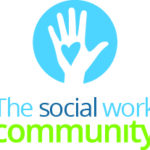
by Anna Bedford
I was sat at my desk, feeling like a failure.
I was about six months into being qualified and a child I thought I had been keeping safe had just run away.
I was tired, emotional and overwhelmed – and the one thing that got me through was friendship.
That day, it was the friends I had made at work who let me cry and helped me with practical tasks.
These friendships have supported me in building the resilience I’ve needed to carry on working in social work for the subsequent 15 years.
Share your experience of workplace friendships
 Over on the Social Work Community, we’d love to hear about your experiences of workplace friendships: the good, the bad and everything in between.
Over on the Social Work Community, we’d love to hear about your experiences of workplace friendships: the good, the bad and everything in between.
If you’re not signed up already, the Social Work Community is an safe online space for social work students and qualified practitioners at all levels to share their experiences of the profession and find advice, support and connections.
Sign up now, so you can join the discussion.
We talk about relational practice in the sector, but little is known about the role of workplace friends in social work.
To find out more about how they can impact on wellbeing and professional practice, I interviewed 10 social workers, whose careers spanned from five to over 30 years, as part of my dissertation.
‘I wouldn’t be here without them’
The research showed that friendships at work can inject fun during long days and strengthen loyalty towards organisations.
Participants provided examples of supportive friendships that had helped them “survive” the profession and had even kept them safe.
“I wouldn’t be here without them,” said one social worker. “There’s absolutely no way [I would be]…it’s really, really bloody hard.”
Another children’s practitioner expressed disbelief at how social workers without core workplace friendships survived the hardships of the profession.
“It’s very helpful to have friendships at work – a variety of different people to bring experiences into the pot. I honestly don’t know how people [cope without that].”
Colleagues ‘get’ the work more than personal friends

Photo: Chanelle Malambo/peopleimages.com/AdobeStock
Many participants said that friends outside of social work were supportive, but they just “didn’t get it”.
Their experiences echoed some of my own.
There have been so many times where, at the end of the day, I would be ringing or texting my friends to talk about work, and often these were the same people I had spent all day in the office with.
This also came out in my research:
“We’re pep-talking each other in the office on a morning and then we’re debriefing on the way out,” said a respondent.
“Then when we get home, we’re on TikTok sending each other funny memes.”
The nature of the work can be intense – you can be out on visits all day with one of your colleagues or working late to secure placements for children. This forces you to spend quite a lot more time with your co-workers than in other professions.
I once had to travel for four hours in a car to a secure unit with another social worker and by the end of it she knew more about me than some of the friends I’d had for years.
This is partly because social work creates circumstances where you are required to show vulnerability and it is at those times that friendships flourish. One of the participants phrased it best: “You’re sharing and you’re open and you’re vulnerable right from the start.”
Workplace friendships leading to career development
The interviews also put a spotlight on how workplace friendships can help develop careers.
For some, their colleagues had been the ones who encouraged them to put themselves up for promotions.
Share your story
Would you like to write about a day in your life as a social worker? Do you have any stories, reflections or experiences from working in social work that you’d like to share or write about?
If so, email our community journalist, Anastasia Koutsounia, at anastasia.koutsounia@markallengroup.com
For others, friends who were managers inspired dreams of reaching positions of similar stature.
One of the participants told me she was persuaded into managing a team by one of her friends: “He said to me, ‘You can influence more people as a manager’.”
Another participant said it was their friends’ “faith” that gave them the final push towards reaching higher.
“My friends encouraged me to apply for jobs…they told me that it was time to become a manager and that I could do it, they had got faith in me.”
Longest-lasting friendships were formed as new social workers

Photo by AdobeStock/ Jacob Lund
When looking back, participants also found that the deepest and longest-lasting friendships were formed in the first few years after qualifying – when they are needed the most.
This period is often packed with life lessons, mistakes and emotional ups and downs. It is when social workers learn to lean on each other for support and colleagues become friends.
Respondents particularly expressed worry for those who qualified in the pandemic while working from home, and how this may have restricted opportunities to develop friendships with colleagues.
“There’s a lot of people at work who I know and I really like and I probably would consider them to be friends if I was sat next to them every day. But, because I’m at home, that’s not developed,” said one such social worker.
Covid impact on workplace relationships
This lack of professional support and relationships due to limited contact during Covid may have contributed to practitioners leaving the sector not long after joining it.
When you start in a new team, you are thrust together with people you don’t know, from all different walks of life.
A social worker, commenting on why her friendships from when she first qualified have lasted for over 10 years, called the post-qualifying period “an intense time”.
“We were under so much pressure that we actually leaned on each other quite a lot”.
Create more social opportunities in the workplace
And so it is my belief that workplace friendships should not go under the radar.
They can create an avenue to let off steam, a place to laugh about the unlaughable and an environment where anxiety and unpredictability can be contained.
While senior leaders and managers cannot force friendships to develop, they should strive to create more social opportunities to help cultivate workplace relationships. This could include eradicating hot desking or reducing working from home so that practitioners are in the office more often and can always sit with their teams.
Various participants spoke of the benefits of having team lunches or events like office ‘bake offs’ and of being given the freedom to go and grab a coffee with colleagues.
This was also a personally enjoyable research project to complete. I often witnessed social workers smiling and laughing as they recounted past stories from different decades. It was great to have the opportunity to explore a positive side to social work.
We often dwell on negatives in this sector but, instead, maybe we all need to spend time reflecting on how friendships have shaped our careers?






 Assistive technology and dementia: practice tips
Assistive technology and dementia: practice tips  A trauma-informed approach to social work: practice tips
A trauma-informed approach to social work: practice tips 




 Find out how to develop your emotional resilience with our free downloadable guide
Find out how to develop your emotional resilience with our free downloadable guide  Develop your social work career with Community Care’s Careers and Training Guide
Develop your social work career with Community Care’s Careers and Training Guide  ‘Dear Sajid Javid: please end the inappropriate detention of autistic people and those with learning disabilities’
‘Dear Sajid Javid: please end the inappropriate detention of autistic people and those with learning disabilities’ Ofsted calls for power to scrutinise children’s home groups
Ofsted calls for power to scrutinise children’s home groups Seven in eight commissioners paying below ‘minimum rate for home care’
Seven in eight commissioners paying below ‘minimum rate for home care’
 Facebook
Facebook X
X LinkedIn
LinkedIn Instagram
Instagram
In the absence of any, let alone reflective, supervision and almost universal social worker experience of overbearing if not bullying managers, the only succour, validation, empathy, humour, understanding and emotional support we have is from our colleagues. I can’t say I’m particularly close friends with the colleagues I value but I know I couldn’t get through any work day without them.
Such an important and interesting study.
Lots for SWs and employers to think about so we can all support each other through be present for each other
Irs not just social workers. It’s the admin, the fsw, everyone involved.
No one understands the pressure of an ofsted visit or making changes to policies and putting them into practice as much as the person sat next to you.
I’m currently debating moving on and my only factor in staying is my team and my co-manager. Couldn’t do the job without them.
I’ve been advised I’m too close to my team. I care too much. We celebrate everything and share our bad days. No one struggles alone and we can tell when someone is not in a good place. As a manager I’ve created a second family and its not entirely welcomed by others. Outside the team.
But we also have the best data in the service and I have no performance issues or long term sickness
Maybe it’s just that I’m lucky or is it an environment they all feel empowered to do their best.
I know one thing they will be very hard to leave